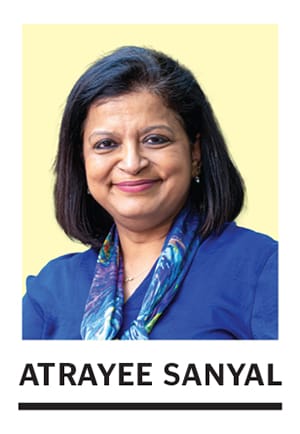Technology should amplify human potential, not replace it
Successful digital transformation requires comprehensive cultural change, balancing efficiency gains with social impact


As the steel industry undergoes unprecedented transformation, Tata Steel champions a balanced approach, where cutting-edge technology and human empowerment move hand-in-hand. We recognised early on that adopting advanced technologies such as artificial intelligence (AI), Internet of Things (IoT) and process automation would only succeed if built on a strong digital and cultural foundation. This meant addressing mindset shifts, unifying digital strategies, building trust in data and developing talent capabilities.
A core tenet of our strategy is that technology should amplify human potential, not replace it. We have consciously chosen to deploy technology as a ‘co-pilot’ rather than a substitute for our workforce. We are committed to reskilling and equipping our workforce for emerging roles, ensuring that as the organisation progresses, our people grow and succeed with it.
Tata Steel has deployed more than 650 AI and machine learning models across the value chain—from mines and mills to markets—powering manufacturing excellence, functional efficiency and customer experience. These interventions raise safety standards, boost productivity and enrich overall job satisfaction.
Our transformation success is rooted in comprehensive workforce development. The collaboration between the human resources (HR) and technology teams has created a multi-tiered upskilling strategy for different workforce segments. One of our most innovative initiatives has been reverse mentoring programmes where younger, digitally native employees train senior managers and executives. Even our CEO participated in them, creating a culture of continuous learning throughout the organisation.
Building on this success, the company has launched Reverse Mentoring 2.0, focussed on AI. Through this initiative, young in-house talent mentor senior leaders on the latest AI tools and trends, enabling the leadership to leverage AI-driven solutions across business functions.

Tata Steel’s Integrated Remote Operations Control system allows control room operators to manage complex processes from several hundred kilometres away. This shift impacts talent acquisition, directly addressing the relocation hesitancy often associated with our remotely located mines. Our HR strategy focuses on transitioning employees from dangerous, manual roles into higher-value positions as system monitors, data analysts and AI operations specialists. It also eliminates routine, transactional tasks, creating space for more advanced and strategic initiatives.
The company has also introduced an internal digital assistant that responds to employee queries related to company matters, enhancing productivity and the employee experience.
Technological integration in our operations has also helped us advance our diversity targets. Technological advancements have helped create a more level playing field for women, in roles that were male-dominated. We deployed India’s first-ever all-women shift in an iron ore mine, and have onboarded transgender operators. We have achieved 20 percent diversity in our India operations workforce, setting benchmarks for gender diversity in manufacturing.
We are actively leveraging GenAI tools such as ‘Resume Screener’, which intelligently analyses applications to enable holistic candidate evaluations, and ‘Hire Assist’, which generates job descriptions based on designation, location, years of experience, etc. In addition, we are exploring GenAI’s potential as an interview assistant and note-taker, allowing interviewers to focus fully on candidate engagement and make more insightful hiring decisions. Together, these innovations empower our HR professionals to drive more strategic, efficient and empathetic talent acquisition.
Tata Steel has become the only steel company globally with three World Economic Forum (WEF) Lighthouse sites: Ijmuiden in The Netherlands, and Kalinganagar and Jamshedpur in India. These certifications cover 80 to 82 percent of our global production capacity, making Tata Steel one of the most digitally advanced steel companies worldwide. This is complemented by our position as an advanced leader in digital by Gartner for four consecutive years. The company has also been recognised with the WEF’s Global Diversity Equity & Inclusion Lighthouse 2023, the only Indian company to feature in the global list of eight companies.
Our continuous innovation journey combines emerging technologies with a people-first philosophy. We are investing in agentic AI systems for creating employee experience applications. This approach supports sustainability goals through systems that minimise energy consumption and optimise resource efficiency.
Tata Steel’s experience proves that traditional industries can embrace digital transformation without social disruption. We believe that successful digital transformation requires comprehensive cultural change, balancing efficiency gains with social impact. This transformation is ultimately built on committed investment in data infrastructure and a culture of continuous learning.
The writer is chief people officer, Tata Steel Group
First Published: Nov 09, 2025, 10:00
Subscribe Now